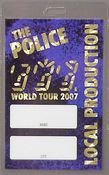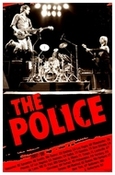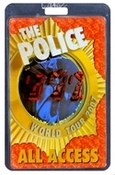
Police Reunion
Jun
15
2007
Las Vegas, NV, US
MGM Grand Garden Arenawith Fiction Plane
Dark side of the reunion...
The regrouped Police underwhelm, while Roger Waters shines on without Pink Floyd...
As Generation X ages, earns more and revels in nostalgia vogue, the reunion circuit has become a gold mine for bands and deep-pocketed fans. Now, even the most acrimonious acts - The Pixies, Dinosaur Jr., The Jesus and Mary Chain - have reconciled for a shot at old glory, cross-generational appeal and, naturally, a hefty payday. There can be no other way to explain the regrouping of The Police, playing together for the first time in 20 years and selling more concert tickets than any other live act this year.
Thankfully, the argument for artists not taking such bait is also being presented, in the form of former chief Pink Floyd songwriter Roger Waters' current trek.
Both stadium titans touched down at the MGM June 15-16 and offered the case for and against rock reunions. And though The Police gig was clearly the most anticipated of the two - the Grand Garden was at capacity for the British trio - it was Waters' performance that truly resonated with its audience and avoided what might've been just another nostalgia show.
It was hard not to feel somewhat underwhelmed by The Police's two-hour June 15 concert, the band's first in Las Vegas and, at top-ticket prices of nearly $300, the more expensive of the two last weekend. When vocalist/bassist Sting, guitarist Andy Summers and percussionist Stewart Copeland thrived in the late '70s and early '80s, they caused a stir for their fresh approach to post-punk rock: an expert juxtaposition of rock-steady fluidity and melodic precision. And those elements were more or less present at the MGM, whether in the instrumental synergy of 'Wrapped Around Your Finger' and 'So Lonely' or in the vigor of 'King of Pain' and 'Next To You'. But, even when you consider the lofty expectations fans have for reunion gigs, it still wasn't enough.
For all the band's stretching and reworking of its catalog, it was fleetingly exciting, and the tepid crowd response confirmed it; The Police frequently seemed to be playing to each other and no one else, especially in the sagging middle hour. Each player flubbed their contributions at times, and not in the spirit of punk sloppiness, as evidenced in 'Synchronicity 2'. Choruses were downplayed and undersung, ruining otherwise spry classics like 'Don't Stand So Close To Me''' And its random political tones - such as the images of Iraqi and Third World children during 'Invisible Sun' - seemed forced and arbitrary.
Contrast that last criticism to Waters' entire June 16 show, which was all but billed as a nostalgia-fest with ads touting the performance of Pink Floyd's 1973 masterpiece, 'Dark Side of the Moon'. That was a key selling point, for sure, and Waters and his 10-piece bad executed it during the second set with more goose-pimpling grandeur and exacting craftsmanship than his old bandmates did as Pink Floyd in a 1995 London concert. But it wasn't as thrilling as the socio-political fervor of the first set and the encore.
By pulling both music and imagery from both Pink Floyd and his solo albums with minimal manipulation of their context (the 'Habeas Corpus Matters'-tagged inflatable pig and Bush-swiping during new song 'Leaving Beirut' aside), Waters was able to make pointed anti-war, pro-global community pronouncements without having to overreach. It was a remarkable revelation - instead of pop music catching up with the times, it seemed the times caught up with the music, Waters' famously war-scarred pathos more relevant now than it was 30 years ago. Even during the performance of 'Dark Side', anthems like 'Money', 'Time' and 'Us and Them' reflected the current malaise, rendering the recreation more than just a flashback. That sounds pretty heavy for an arena rock show. But Waters offered enough visual stimulation (in his case, lots of pyro), surround-sound pizzazz, and fist-hoisting ('Another Brick in the Wall') and lighter-waving ('Wish You Were Here') moments to enrapture even the most politically indifferent attendees.
Had Waters reunited with Pink Floyd, all the focus would have been on the novelty of David Gilmour and Waters playing together. But by merely serving as the evening's conductor, and perfectly balancing elements both on- and off-stage, Waters provided an engulfing live experience that amounted to much more than reliving past glory.
(c) Las Vegas City Life by Mike Prevatt
Discrete Excess: The Police strikingly self-assured - Improvisational skills still amazing...
There Andy Summers was, bent at the knees, burrowing into the tune like it was made of clay, excavating all the slippery, salivating leads from the number the way a dentist mines a cavity.
The song was 'So Lonely', and The Police guitarist pushed hard against the bounds of the temperamental rocker, soloing feverishly, slapping his whammy bar around and banging on his instrument like some closed door he was trying to kick down.
The crowd waited for Summers to come up for air, and they waited a long time.
But then he snapped back in line with his bandmates - drummer Stewart Copeland and singer/bassist Sting, who were locked in with one another like a couple of schoolyard bullies engaged in a staring contest - joining them in meting out a tight, simple groove.
Discrete excess. Does such a thing exist?
It does when The Police are in town.
Performing in Las Vegas for the first time, the band's tunes were a mix of economy and extravagance, at once Spartan and sophisticated, defined largely by their symmetry. Their songs are laden with trapdoors that plunge a straightforward pop tune into a sweaty exercise in controlled chaos.
Playing to a sold-out MGM Grand Garden, the band was at its best when plumbing the crevices of their hit-filled catalog to uncover new shapes and forms hidden in the shadows.
They grafted 'Voices In My Head' and 'When The World Is Running Down, You Make the Best of What's Still Around' into a high-impact medley with rolling thunder drums and Summers breathing fire with some crazy-eyed soloing.
Sparks also flew when the band teased even more serrated funk out of 'Truth Hits Everyone' and put the hammer down on 'Driven To Tears', whacking at it like a piñata with odd metered rhythms.
In this context, standards like the show-opening 'Message In A Bottle' and 'Don't Stand So Close To Me' occasionally felt stiff-limbed by comparison, even though they were executed with an emphasis on surgical precision and proficiency.
It's just that this band sounds best when goading each other on in new directions, indulging in each other's sizable improvisational skills like kids gorging on birthday cake.
It all begins with Copeland, who swings hard, playing with his hands over his head at times, lashing at his snare like he's cracking a whip. Sting counters with malleable, sharp elbowed basslines, his rocket-launcher voice soaring high above the band's tunes.
The end result can be lilting and meditative - Spirits in the Material World', 'This Bed's Too Big Without You' - or raucous and raw as a skinned knee - 'Synchronicity II', the show-ending 'Next To You'.
Either way, it's never bashful, and neither are these dudes. Sting was taking bows after the fourth song, and Copeland opened the show by banging on a gong the size of Wyoming.
It's this self-assuredness that has both defined The Police and caused the band to fissure when egos became as outsized as the group's record sales. But at the MGM Grand, all this pomp and verve was put to good use.
''The meek shall inherit the Earth,'' Sting bawled on 'Walking In Your Footsteps'.
Um, yeah, not on this night.
(c) Las Vegas Review-Journal by Jason Bracelin
The regrouped Police underwhelm, while Roger Waters shines on without Pink Floyd...
As Generation X ages, earns more and revels in nostalgia vogue, the reunion circuit has become a gold mine for bands and deep-pocketed fans. Now, even the most acrimonious acts - The Pixies, Dinosaur Jr., The Jesus and Mary Chain - have reconciled for a shot at old glory, cross-generational appeal and, naturally, a hefty payday. There can be no other way to explain the regrouping of The Police, playing together for the first time in 20 years and selling more concert tickets than any other live act this year.
Thankfully, the argument for artists not taking such bait is also being presented, in the form of former chief Pink Floyd songwriter Roger Waters' current trek.
Both stadium titans touched down at the MGM June 15-16 and offered the case for and against rock reunions. And though The Police gig was clearly the most anticipated of the two - the Grand Garden was at capacity for the British trio - it was Waters' performance that truly resonated with its audience and avoided what might've been just another nostalgia show.
It was hard not to feel somewhat underwhelmed by The Police's two-hour June 15 concert, the band's first in Las Vegas and, at top-ticket prices of nearly $300, the more expensive of the two last weekend. When vocalist/bassist Sting, guitarist Andy Summers and percussionist Stewart Copeland thrived in the late '70s and early '80s, they caused a stir for their fresh approach to post-punk rock: an expert juxtaposition of rock-steady fluidity and melodic precision. And those elements were more or less present at the MGM, whether in the instrumental synergy of 'Wrapped Around Your Finger' and 'So Lonely' or in the vigor of 'King of Pain' and 'Next To You'. But, even when you consider the lofty expectations fans have for reunion gigs, it still wasn't enough.
For all the band's stretching and reworking of its catalog, it was fleetingly exciting, and the tepid crowd response confirmed it; The Police frequently seemed to be playing to each other and no one else, especially in the sagging middle hour. Each player flubbed their contributions at times, and not in the spirit of punk sloppiness, as evidenced in 'Synchronicity 2'. Choruses were downplayed and undersung, ruining otherwise spry classics like 'Don't Stand So Close To Me''' And its random political tones - such as the images of Iraqi and Third World children during 'Invisible Sun' - seemed forced and arbitrary.
Contrast that last criticism to Waters' entire June 16 show, which was all but billed as a nostalgia-fest with ads touting the performance of Pink Floyd's 1973 masterpiece, 'Dark Side of the Moon'. That was a key selling point, for sure, and Waters and his 10-piece bad executed it during the second set with more goose-pimpling grandeur and exacting craftsmanship than his old bandmates did as Pink Floyd in a 1995 London concert. But it wasn't as thrilling as the socio-political fervor of the first set and the encore.
By pulling both music and imagery from both Pink Floyd and his solo albums with minimal manipulation of their context (the 'Habeas Corpus Matters'-tagged inflatable pig and Bush-swiping during new song 'Leaving Beirut' aside), Waters was able to make pointed anti-war, pro-global community pronouncements without having to overreach. It was a remarkable revelation - instead of pop music catching up with the times, it seemed the times caught up with the music, Waters' famously war-scarred pathos more relevant now than it was 30 years ago. Even during the performance of 'Dark Side', anthems like 'Money', 'Time' and 'Us and Them' reflected the current malaise, rendering the recreation more than just a flashback. That sounds pretty heavy for an arena rock show. But Waters offered enough visual stimulation (in his case, lots of pyro), surround-sound pizzazz, and fist-hoisting ('Another Brick in the Wall') and lighter-waving ('Wish You Were Here') moments to enrapture even the most politically indifferent attendees.
Had Waters reunited with Pink Floyd, all the focus would have been on the novelty of David Gilmour and Waters playing together. But by merely serving as the evening's conductor, and perfectly balancing elements both on- and off-stage, Waters provided an engulfing live experience that amounted to much more than reliving past glory.
(c) Las Vegas City Life by Mike Prevatt
Discrete Excess: The Police strikingly self-assured - Improvisational skills still amazing...
There Andy Summers was, bent at the knees, burrowing into the tune like it was made of clay, excavating all the slippery, salivating leads from the number the way a dentist mines a cavity.
The song was 'So Lonely', and The Police guitarist pushed hard against the bounds of the temperamental rocker, soloing feverishly, slapping his whammy bar around and banging on his instrument like some closed door he was trying to kick down.
The crowd waited for Summers to come up for air, and they waited a long time.
But then he snapped back in line with his bandmates - drummer Stewart Copeland and singer/bassist Sting, who were locked in with one another like a couple of schoolyard bullies engaged in a staring contest - joining them in meting out a tight, simple groove.
Discrete excess. Does such a thing exist?
It does when The Police are in town.
Performing in Las Vegas for the first time, the band's tunes were a mix of economy and extravagance, at once Spartan and sophisticated, defined largely by their symmetry. Their songs are laden with trapdoors that plunge a straightforward pop tune into a sweaty exercise in controlled chaos.
Playing to a sold-out MGM Grand Garden, the band was at its best when plumbing the crevices of their hit-filled catalog to uncover new shapes and forms hidden in the shadows.
They grafted 'Voices In My Head' and 'When The World Is Running Down, You Make the Best of What's Still Around' into a high-impact medley with rolling thunder drums and Summers breathing fire with some crazy-eyed soloing.
Sparks also flew when the band teased even more serrated funk out of 'Truth Hits Everyone' and put the hammer down on 'Driven To Tears', whacking at it like a piñata with odd metered rhythms.
In this context, standards like the show-opening 'Message In A Bottle' and 'Don't Stand So Close To Me' occasionally felt stiff-limbed by comparison, even though they were executed with an emphasis on surgical precision and proficiency.
It's just that this band sounds best when goading each other on in new directions, indulging in each other's sizable improvisational skills like kids gorging on birthday cake.
It all begins with Copeland, who swings hard, playing with his hands over his head at times, lashing at his snare like he's cracking a whip. Sting counters with malleable, sharp elbowed basslines, his rocket-launcher voice soaring high above the band's tunes.
The end result can be lilting and meditative - Spirits in the Material World', 'This Bed's Too Big Without You' - or raucous and raw as a skinned knee - 'Synchronicity II', the show-ending 'Next To You'.
Either way, it's never bashful, and neither are these dudes. Sting was taking bows after the fourth song, and Copeland opened the show by banging on a gong the size of Wyoming.
It's this self-assuredness that has both defined The Police and caused the band to fissure when egos became as outsized as the group's record sales. But at the MGM Grand, all this pomp and verve was put to good use.
''The meek shall inherit the Earth,'' Sting bawled on 'Walking In Your Footsteps'.
Um, yeah, not on this night.
(c) Las Vegas Review-Journal by Jason Bracelin
June 15, 2007
SET LIST
- Message In A Bottle
- Synchronicity II
- Don't Stand So Close To Me
- Voices Inside My Head
- When The World Is Running Down You Make The Best Of What's Still Around
- Spirits In The Material World
- Driven To Tears
- Walking On The Moon
- Truth Hits Everybody
- Every Little Thing She Does Is Magic
- Wrapped Around Your Finger
- The Bed's Too Big Without You
- De Do Do Do, De Da Da Da
- Invisible Sun
- Walking In Your Footsteps
- Can't Stand Losing You
- Roxanne
- King Of Pain
- So Lonely
- Every Breath You Take
- Next To You





